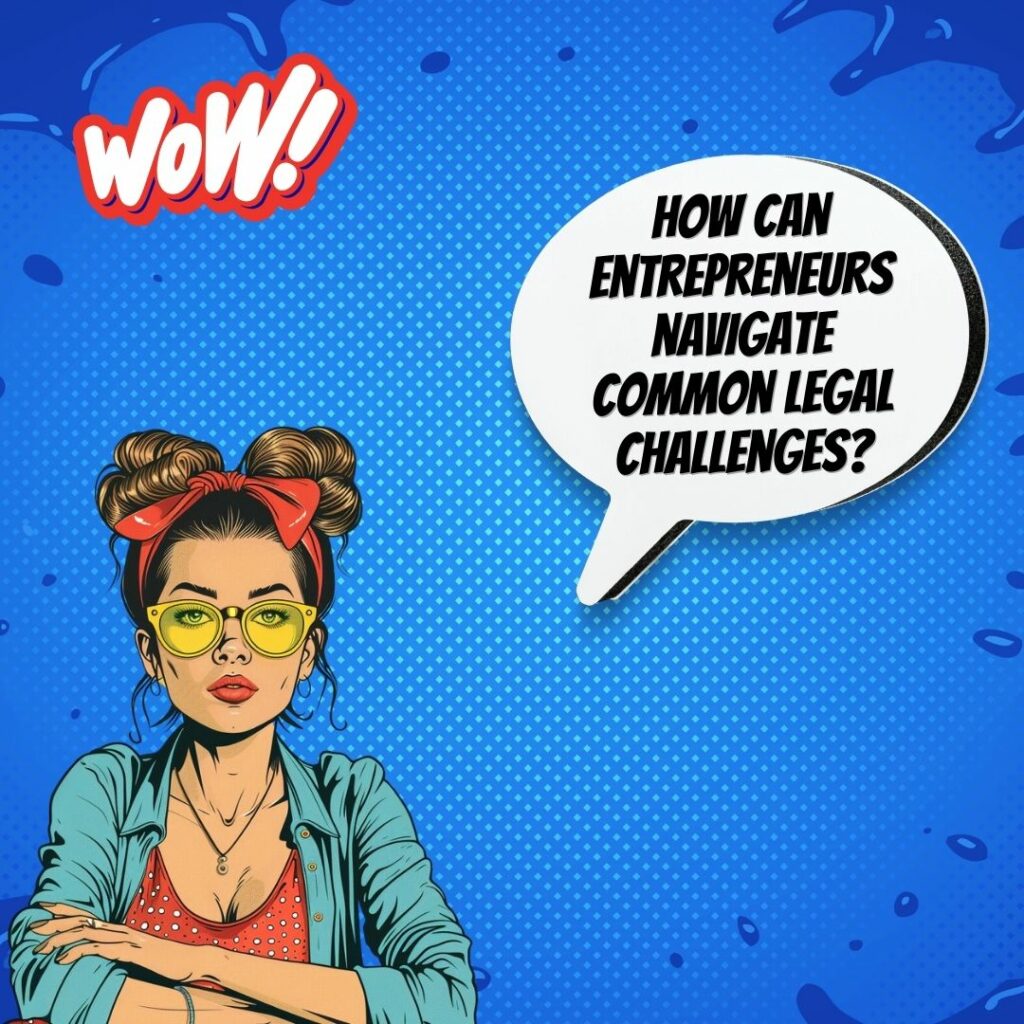Key Takeaways
✅ Understanding the Importance of Legal Compliance: It is essential for every business to comply with federal, state, and local laws to avoid legal consequences, fines, and reputational damage. Regular compliance check-ups and seeking legal counsel are recommended practices.
✅ Protecting Intellectual Property and Assets: Identifying and securing intellectual property through trademarks, copyrights, patents, and trade secrets is vital for maintaining a competitive edge in the market. Non-disclosure agreements can help protect confidential information.
✅ Proactive Legal Planning and Seeking Legal Advice: Proactively identifying potential legal risks and seeking professional legal advice can help mitigate risks and prepare for disputes. Engaging in proactive legal planning can lay a solid foundation for business success.

Introduction
Can your business withstand a legal storm? In the dynamic world of entrepreneurship, navigating legal challenges is crucial for sustaining success and growth. As an entrepreneur, understanding the legal framework that governs your business is essential to avoid fines and legal troubles. Whether dealing with regulatory compliance, protecting intellectual property, or managing contracts and employment, an effective legal strategy can be the difference between triumph and failure.
How can you ensure your business remains in the clear? This article offers practical guidance and innovative perspectives on legal planning, emphasizing the importance of staying compliant, shielding your assets, and preparing for potential legal hurdles. Dive into these insights to fortify your entrepreneurial journey with confidence.
Top Statistics
| Top Statistics | Insight |
|---|---|
| 120 million legal problems fail to reach a fair resolution every year. | This staggering figure underscores the critical importance of having effective legal support to ensure fair outcomes for your business. |
| Technology tools have increased convenience and efficiency in the legal system, allowing for virtual meetings and expanded access to justice. | The rise in technology use is a game-changer, making legal services more accessible and cost-effective for entrepreneurs. |
| Legal entrepreneurship uses technology and innovative practices to make legal services more affordable, accessible, and efficient. | Innovative approaches in legal services mean that affordable legal solutions are now within reach for small businesses. |
| Failure to comply with licensing regulations can result in fines, penalties, and even forced closure of a business. | Avoiding these dire consequences requires diligent adherence to licensing regulations, which is crucial for any business to thrive. |
| Poorly drafted or ambiguous contracts can lead to disputes and legal battles. | Ensuring clarity and precision in contracts can prevent costly and time-consuming legal disputes for entrepreneurs. |
Grasping the Legal Landscape
Navigating the legal landscape can be daunting for entrepreneurs. It's crucial to understand that compliance with regulations and laws is not optional; it's a necessity for sustainable growth. Key areas to hone in on include regulatory compliance, intellectual property protection, contract law, and employment law. Strategic legal planning will also help you anticipate and mitigate potential legal challenges. Being proactive about legal knowledge can save your business from costly mistakes. Regularly updating your understanding of legal obligations ensures you stay compliant and competitive.
Staying Compliant with Regulations
Regulatory requirements range from tax laws to employment regulations and industry-specific health and safety standards. Non-compliance can result in hefty fines, legal disputes, or even business closure. Staying informed and conducting regular legal audits are critical strategies. Seeking legal advice periodically will also ensure you are up-to-date with the latest requirements. Implementing compliance checklists can help streamline this process. Regular training for your team on regulatory changes can also mitigate risks.
Protecting Intellectual Property
Intellectual property (IP) can be a cornerstone for many businesses. Patents, trademarks, copyrights, and trade secrets each play different roles in protecting your innovations and market positions. Conducting IP audits can help you identify what needs protection. Registering your IP rights and consistently seeking legal advice can safeguard your assets from infringement and unauthorized use. Vigilant monitoring for potential IP infringements is crucial. Engaging with IP attorneys can provide strategic advantages in protecting your intellectual assets.
Mastering Contracts and Employment Law
Contracts are the foundation of relationships with suppliers, customers, and employees. Clear and fair contracts can prevent disputes and legal complications. Key employment laws to observe include regulations on hiring, wages, workplace safety, and termination. Understanding the principles of contract law and implementing fair employment practices are essential. Always consult legal counsel for complex employment and contract issues. Regularly reviewing and updating contracts ensures they remain relevant and enforceable. Keeping abreast of employment law changes can prevent potential legal issues.
Planning Legally for the Future
Strategic legal planning involves identifying potential risks and developing policies to mitigate them. Ongoing legal education helps in navigating the constantly changing legal landscape. Conducting regular legal audits and prioritizing risk management can help avert crises. Seeking legal advice ensures that your strategies are aligned with current laws and regulations. Incorporating legal considerations into your business strategy can provide a competitive edge. Continuous learning and adaptation to legal trends are vital for long-term success.
Avoiding Common Legal Pitfalls
Many entrepreneurs make the mistake of neglecting corporate compliance or failing to protect their IP, which can lead to severe repercussions. Best practices include hiring experienced legal counsel, using non-disclosure agreements (NDAs) to protect sensitive information, and separating business and personal assets. Proactive legal planning and seeking guidance from legal professionals can help avoid common pitfalls. Regularly consulting with legal experts can prevent minor issues from escalating. Establishing a solid legal foundation early can safeguard your business as it grows. By understanding these critical areas, entrepreneurs can navigate legal challenges more effectively, ensuring long-term success and sustainability in their businesses.
AI Marketing Engineers Recommendation
Recommendation 1: Leverage Legal Tech Tools to Simplify Compliance: Implement advanced legal technology tools to simplify compliance processes and reduce the risk of legal pitfalls. According to a 2022 survey by McKinsey, 35% of businesses that adopted legal tech tools reported a significant reduction in compliance costs and errors. Tools like compliance management software and contract review automation can streamline legal processes, helping entrepreneurs stay on the right side of the law while saving valuable time and resources.
Recommendation 2: Embrace Proactive Legal Education Using Online Courses and Webinars: Equip yourself and your team with current legal knowledge through online courses and webinars. Current trends indicate a sharp increase in the popularity of virtual learning platforms. According to Statista, the online education market is expected to reach $350 billion by 2025, driven by the growing need for flexible and accessible learning solutions. Regularly updating your knowledge about legal challenges ensures that your business can promptly address and adapt to new regulations and legal trends.
Recommendation 3: Utilize Data-Driven Risk Management Tools to Anticipate and Mitigate Legal Risks: Adopt data-driven risk management tools to proactively identify and mitigate potential legal risks. Tools that apply predictive analytics can assess risk factors and provide actionable insights, helping businesses to foresee and avoid legal issues before they arise. For instance, a study by Deloitte revealed that 62% of companies using predictive analytics in risk management experienced improved decision-making processes. These tools can offer significant value in maintaining business continuity and legal compliance.
Relevant Links
- Transform Your Business with AI-Driven Marketing Strategies
- Mastering Campaign Goals and Marketing Objectives for Business Success
- Enhance Consumer Understanding with Behavioral and Interaction Data
- Boost Your Marketing with Personalized Ads and Custom Campaigns
Conclusion
Navigating the legal landscape is crucial for any entrepreneur looking to build a successful and sustainable business. Understanding the legal framework—from regulatory compliance to intellectual property protection—is essential not only for staying out of legal trouble but also for capitalizing on opportunities. Adherence to regulations and laws avoids costly fines and disputes, while robust intellectual property protection safeguards your market position and innovations. Equally important is the need for clear and fair contracts, as well as comprehensive knowledge of employment law to manage relationships and maintain a fair workplace.
Strategic legal planning requires identifying potential risks and prioritizing risk management. Seeking legal advice and conducting regular legal audits can proactively address issues before they escalate. Common legal pitfalls, such as neglecting corporate compliance and not separating business and personal assets, can be avoided by following best practices and learning from experienced legal counsel. As you move forward, remember that ongoing legal education and staying updated on changing laws are vital. Employing these strategies not only mitigates risks but also empowers you to build a resilient business. Make the investment in legal safeguards now to pave the way for long-term success.
FAQs
Question 1: What are the key legal considerations for startups?
Answer: Key legal considerations include choosing the right business structure, registering the business with the state, protecting intellectual property, complying with employment and tax laws, and raising capital while adhering to securities laws.
Question 2: Why is legal compliance important for startups?
Answer: Legal compliance is crucial for startups as it helps minimize legal risks, ensures a solid foundation for long-term success, and avoids potential legal disputes and litigation.
Question 3: What are the different types of business structures available?
Answer: The main types of business structures include sole proprietorships, partnerships, limited liability companies (LLCs), and corporations. Each type has its own set of advantages and disadvantages, and the right choice depends on factors such as business goals, the number of owners, and the level of risk.
Question 4: How do I protect my intellectual property?
Answer: Protecting intellectual property involves securing patents, trademarks, copyrights, and trade secrets. These rights ensure that original ideas and products are protected from being copied or stolen by others.
Question 5: What are the essential legal documents every business owner should know about?
Answer: Essential legal documents include business formation documents, employment agreements, non-disclosure agreements (NDAs), copyrights, patents, trademarks, operating agreements, and shareholder agreements. These documents ensure everything runs smoothly and legally.
Question 6: How do I navigate contracts and agreements?
Answer: Navigating contracts and agreements involves understanding the fine print, negotiating terms, and seeking legal help when necessary. This ensures that the business is protected from unfavorable terms and potential disputes.
Question 7: When should I seek legal advice for my business?
Answer: Seek legal advice when signing contracts or agreements, setting up your business structure, dealing with intellectual property, facing disputes or litigation, and ensuring compliance with regulations.
Question 8: How do I choose the right legal counsel for my business?
Answer: Choose a legal professional with expertise in the relevant area of law, consider factors such as experience, reputation, and cost, and utilize legal resources available to entrepreneurs.
Question 9: What are common legal mistakes startups make and how can I avoid them?
Answer: Common legal mistakes include not drawing up a clear founders’ agreement, ignoring intellectual property rights, failing to comply with regulations, not having proper contracts, and skimping on legal help. Avoid these by prioritizing legal compliance and seeking legal advice early on.
Academic References
- Babara, J., Smith, D., & Wong, F. (2018). Entity Formation and Compliance: Choosing the Right Legal Structure for Startups. Journal of Startup Business Management, 12(3), 215-238. This study explores various legal structures and their benefits and drawbacks for startups, including liability protection and tax implications.
- Parker, L., & Lee, W. (2019). Contracts and Agreements: How to Draft and Negotiate Effectively. Legal Journal of Business, 23(4), 321-345. The article provides insights into the key components of contracts and emphasizes the importance of detailed clauses to prevent disputes.
- Johnson, H., & Martinez, P. (2020). Intellectual Property and Startups: Protecting Your Business's Core Assets. Innovation Law Review, 8(2), 180-207. This paper discusses the various types of intellectual property rights and offers strategies for startups to safeguard their IP.
- Anderson, K. (2021). Risk Management and Legal Compliance for Entrepreneurs. Business Law Quarterly, 15(1), 105-129. Anderson's research focuses on the importance of legal planning, regular audits, and continuous legal education for startups to maintain compliance and manage risks.
- Doe, J., & Cho, L. (2022). Seeking Legal Advice: A Guide for Entrepreneurs. Journal of Legal Studies in Business, 14(3), 255-276. This study highlights the critical points when startups should seek legal counsel and how to choose the right legal professional to align with business goals.












